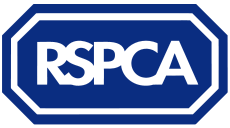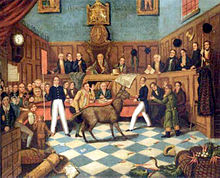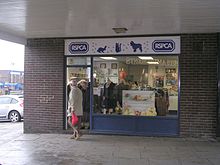Royal Society for the Prevention of Cruelty to Animals
 |
|
| Founder(s) | Richard Martin, William Wilberforce, Reverend Arthur Broome |
|---|---|
| Founded | 1824 |
| Headquarters | Southwater, West Sussex, England |
| Key people | Gavin Grant (Chief Executive) |
| Area served | England & Wales |
| Focus | Animals |
| Revenue | GBP £116.2m (2011)[1] |
| Employees | 1,667 (2011) |
| Website | http://www.rspca.org.uk |
The Royal Society for the Prevention of Cruelty to Animals (RSPCA) is a charity operating in England and Wales that promotes animal welfare. In 2011, the RSPCA investigated 159,759 cruelty complaints and collected and rescued 119,126 animals,[2] while euthanizing 53,183.[3] It is the oldest and largest animal welfare organisation in the world[4] and is one of the largest charities in the UK, with 1,453 employees (as of 2009).[5]
The charity's work has inspired the creation of similar groups in other jurisdictions, starting with the Ulster Society for the Prevention of Cruelty to Animals (founded in 1836), and including the Scottish Society for Prevention of Cruelty to Animals (1839), the Dublin Society for the Prevention of Cruelty to Animals (1840), the American Society for the Prevention of Cruelty to Animals (1866), the Royal New Zealand Society for the Prevention of Cruelty to Animals (1882), and various groups which eventually came together as the Royal Society for the Prevention of Cruelty to Animals Australia (1981).
The RSPCA is funded primarily by voluntary donations. In 2009, RSPCA total income was £129,251,000, total expenditure was £119,339,000.[5] Its patron is Queen Elizabeth II.
Contents |
History[edit]

The organisation was founded in 1824 (without the "royal" prefix) as the Society for the Prevention of Cruelty to Animals; it was established by a group of 22 reformers led by Richard Martin MP, William Wilberforce MP and the Reverend Arthur Broome in ‘Old Slaughter’s Coffee House’, St Martin's Lane, near the Strand. The foundation is marked by a plaque on the modern day building at 77-78 St Martin's Lane.[6]
The society was the first animal welfare charity to be founded in the world.[citation needed] In 1824 it brought sixty three offenders before the courts.[7] It was granted its royal status by Queen Victoria in 1840 to become the Royal Society for the Prevention of Cruelty to Animals, as it is today.[8] In the late 1830s the society began the tradition of the RSPCA inspector, which is the image best known of the organisation today.
The RSPCA lobbied Parliament throughout the nineteenth century, resulting in a number of new laws. The Cruelty to Animals Act 1835 amended Martin's Act and outlawed baiting. In 1876 the Cruelty to Animals Act was passed to control animal experimentation. In 1911 Parliament passed Sir George Greenwood's Animal Protection Act.
Since that time the RSPCA has continued to play an active role, both in the creation of animal welfare legislation and in its enforcement. An important recent new law has been the Animal Welfare Act 2006.[9][10]
Structure[edit]
RSPCA centres, hospitals and branches operate throughout England and Wales. In 2009 they treated 217,497 sick or injured animals and rehomed 70,030 animals.[11]
Hospitals[edit]
In 2013 the society owned four animal hospitals, Birmingham, Greater Manchester, Putney (south London) and the Harmsworth Memorial Hospital in Holloway (north London),[12] and a number of clinics which provide treatments to those who could not otherwise afford it, neuter animals and accept animals from the RSPCA inspectorate.
Centres[edit]
RSPCA animal centres deal with a wide range of injured and rescued animals, working alongside its inspectorate, volunteers, and others to ensure that each animal is found a new home.
In 2013 the Society had four wildlife centres at East Winch (Norfolk), West Hatch (Somerset), Stapeley Grange (Cheshire) and Mallydams Wood (East Sussex), which provide treatment to sick, injured and orphaned wild animals to maximise their chances of a successful return to the wild.[13]
Branches[edit]
RSPCA branches operate locally across England and Wales. Some are separately registered charities operating at a local level and are run by volunteers. Some RSPCA branches are self-funding and raise money locally to support the animal welfare work they do. They find homes for about three-quarters of all animals taken in by the RSPCA. RSPCA branches also offer advice, microchipping, neutering and subsidised animal treatments. In 2013 there were also about 215 RSPCA shops.
Groups[edit]
Each Region of the RSPCA contains 'Groups' of Inspectorate staff. A Group is headed by a Chief Inspector. Each Chief Inspector might typically be responsible for around 8 or more Inspectors, 3 Animals Welfare Officers (AWOs) and 2 Animal Collection Officers (ACOs), working with several local Branches. There are also a small number of Market Inspectors across the country.[14]
Regions[edit]
There are five 'Regions' (North, East, Wales & West, South & South West, South East), each headed by a Regional Manager (responsible for all staff and RSPCA HQ facilities) assisted by a Regional Superintendent who has responsibility for the Chief Inspectors, Inspectors, AWOs and ACOs. The Regional Managers are expected to have a broad understanding of operations throughout their regions.[9]
National[edit]
At the national level, there is a 'National Control Centre', which receives all calls from members of the public, and tasks local Inspectors, AWOs or ACOs to respond to urgent calls.[15]
Additionally the £16 million[16] 'National Headquarters' located at Southwater in West Sussex houses several general 'Departments', each with a departmental head, consistent with the needs of any major organisation. The current Chief Executive Officer is Gavin Grant and he manages five Directors who all have responsibility for a number of relevant departments.
Mission statement and charitable status[edit]
The RSPCA is a registered charity (no. 219099) that receives no lottery or state aid. The RSPCA states that its mission as a charity is, by all lawful means, to prevent cruelty, promote kindness to and alleviate suffering of animals.
On account of the opportunities it provides for the personal development of young people, the RSPCA is a member of The National Council for Voluntary Youth Services (NCVYS).[17]
RSPCA inspectors respond to calls from the public to investigate alleged mistreatment of animals. They offer advice and assistance to improve animal welfare, and in some cases prosecute under laws such as the Animal Welfare Act 2006.
Animals rescued by the RSPCA are treated, rehabilitated and rehomed or released wherever possible.[18] Where it is not possible to rehome or release an animal the RSPCA may consider humanely euthanaising the animal (normally carried once a 14 day limit is reached).
The RSPCA brings private prosecution (a right available to any civilian) against those it believes, based on independent veterinary opinion, have caused neglect to an animal under laws such as the Animal Welfare Act 2006. The Society has its own legal department and veterinary surgeons amongst the resources which facilitate such private prosecutions. All prosecutions are brought via independent solicitors acting for the RSPCA, as the Association has no legal enforcement powers or authority in its own right.
Inspectorate rank insignia[edit]
Criticism[edit]
Lack of statutory powers and allegations of police impersonation[edit]
The RSPCA rank names and rank insignia share similarity with British police ranks, which has led some critics (such as Chris Newman, chairman of the Federation of Companion Animal Societies)[19] to suggest an attempt to "adopt" police powers in the public imagination. When Richard Girling of The Times asked about their lack of powers, a spokesman for the RSPCA said "We would prefer you didn’t publish that, but of course it's up to you".[19] Chris Newman claimed that the RSPCA "impersonate police officers and commit trespass. People do believe they have powers of entry";[19] however, he did not produce any evidence of such impersonation of police officers, and the Society strongly deny the charge of impersonation, but were not willing to comment on the issue of illegal trespass.
Sally Case, head of prosecutions, insists that RSPCA inspectors are trained specifically to make clear to pet-owners that they have no such right. They act without an owner’s permission, she says, “only if an animal is suffering in a dire emergency. If the court feels evidence has been wrongly obtained, it can refuse to admit it”.[19] The RSPCA logo is clearly visible on the uniform worn by RSPCA officers, all carry RSPCA ID cards, and their vans are clearly liveried with the RSPCA logo.
One recent trial was halted and charges relating to nine dogs were thrown out of court after District Judge Elsey ruled that they had been wrongly seized and that the RSPCA and police acted unlawfully when they entered private property and seized the animals.[20]
While the Protection of Animals Act 1911 provided a power of arrest for police, the British courts have determined that Parliament did not intend any other organisation such as the RSPCA to be empowered under the Act and that the RSPCA therefore does not possess police-like powers of arrest, of entry or of search (Line v RSPCA, 1902). Like any other person or organisation that the law deems to have a duty to investigate – such as HM Customs and Excise and Local Authority Trading Standards – the RSPCA is expected to conform to the rules in the Police and Criminal Evidence Act 1984 so far as they relate to matters of investigation. RSPCA officers are trained to state, following giving the caution, that the person is "not under arrest and can leave at any time". The Animal Welfare Act 2006 has now replaced the Protection of Animals Act 1911 and it empowers the police and an inspector appointed by a local authority, but not an "Inspector" of the RSPCA.
Fund-raising in Scotland[edit]
The RSPCA has been criticised by the Scottish SPCA for fund-raising in Scotland and thereby "stealing food from the mouths of animals north of the border by taking donations intended for Scotland."[21] The RSPCA insists that it does not deliberately advertise in Scotland but that many satellite channels only enabled the organisation to purchase UK-wide advertising. In a statement, the RSPCA said it went "to great lengths" to ensure wherever possible that adverts were not distributed outside England and Wales.
It said: "Every piece of printed literature, television advertising and internet banner advertising always features the wording 'The RSPCA is a charity registered in England and Wales'". "All Scottish donors, who contact us via RSPCA fundraising campaigns, are directed to the Scottish SPCA so that they can donate to them if they so wish."[21] The Scottish RSPCA changed its logo in 2005 to make a clearer distinction between itself and the RSPCA in an attempt to prevent legacies being left to its English equivalent by mistake when the Scottish charity was intended.[22]
Sheep slaughter[edit]
In January 2013 the RSPCA needlessly slaughtered 40 sheep and used a photograph of the dead animals to further its campaign against live animal exports.[23] The RSPCA claimed that they were present at the request of the port officials, in an operation headed up by DEFRA, the animals were all checked by several independent vets and humanely put to sleep under the authority of DEFRA, and that their only role in the operation was to ensure animal welfare laws were being adhered to. [24] However, the National Farmers' Union said that it "still leaves many questions to be answered, by both AHVLA and the RSPCA, who it appears exerted significant influence over government officials on the ground", and that "The NFU also still has questions about why the method of slaughter used by the RSPCA officers resulted in so much blood in the photographs that were taken and released to the media by the RSPCA".[25]
Badger culling and politicisation[edit]
The RSPCA has been criticised several times for it campaigns against a proposed badger cull; in 2006 there was controversy about a "political" campaign against culling, with the Charity Commission investigating claims that the charity had breached guidelines by being too overtly political in targeting the government.[26]
See also[edit]
- Animal ethics
- Animal rights
- Cruelty to animals
- Eurogroup for Animals represents organisations such as the RSPCA at the European Union level
- Humane society
- Royal Society for the Protection of Birds (RSPB)
- Society for the Prevention of Cruelty to Animals (links to other SPCA organizations worldwide)
- Society for the Prevention of Cruelty to Animals (Hong Kong) - formerly Royal Society for the Prevention of Cruelty to Animals (Hong Kong) from 1903 to 1997
Further reading[edit]
- Who Cares For Animals: 150 years of the RSPCA by Antony Brown.[27]
- Animal Experimentation: A Guide to the Issues Vaughan Monamy, Cambridge University Press
References[edit]
- ^ Trustee's report and accounts 2011
- ^ "RSPCA Annual review". Retrieved 2012-05-21.
- ^ "RSPCA denies killing too many healthy animals". Retrieved 2013-02-10.
- ^ "Dog Rescue Pages - UK dog rescue centres and welfare organisations". Retrieved 2012-02-29.
- ^ a b Charity Insight page on the RSPCA, accessed 22 November 2010
- ^ City of Westminster green plaques http://www.westminster.gov.uk/services/leisureandculture/greenplaques/
- ^ "The History of the RSPCA". Retrieved 2008-03-24.
- ^ "Our heritage".
- ^ DEFRA page on Animal Welfare Act 2006, accessed 22 November 2010[dead link]
- ^ "Animal Welfare Act".
- ^ "RSPCA in your area".
- ^ "London North (Harmsworth Memorial) Animal Hospital".
- ^ "Wildlife centres".
- ^ "Become an RSPCA officer".
- ^ "Contact the RSPCA".
- ^ "RSPCA millions go on politics and HQ".
- ^ "Full list of NCVYS members". Ncvys.org.uk. Retrieved 2012-03-28.
- ^ Vídeo de cão sendo espancado gera prisão de agressor, Yahoo!, RSPCA
- ^ a b c d "Invasion of privacy". The Times (London). 2007-06-03. Retrieved 2010-05-22.
- ^ "Stanley woman found guilty of mistreating dog". Chronicle Live (South Tyneside). 2012-05-21.
- ^ a b Animal groups in bitter cash row BBC News, 3 January 2009
- ^ "New identity for animal charity". BBC News. 1 August 2005.
- ^ Farming. "RSPCA accused of needlessly slaughtering sheep". Telegraph. Retrieved 2013-04-11.
- ^ "0113_5". Rspca.org.uk. 2012-09-12. Retrieved 2013-04-11.
- ^ "RSPCA has questions to answer over Ramsgate, says NFU - Farming UK news". Farminguk.com. Retrieved 2013-04-11.
- ^ "Back off Badgers campaign". 12 Mar 2006. Retrieved 13 March 2013.
- ^ Detail from a copy of the book, published by Heinemann of London in 1974 with an ISBN of 434 90189 X. The chapters relate to the Origin of the Society, and finishes with prospects for the future, with a foreword by John Hobhouse (Chairman of the RSPCA). Appendix section includes a List of Past Presidents and Accounts information.
External links[edit]
- Guidance on the Operation of the Animals (Scientific Procedures) Act 1986
- RSPCA Inspector Career advice
- RSPCA Brighton
- Pet Insurance from the RSPCA
